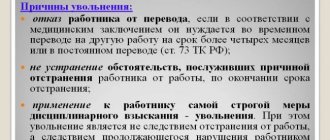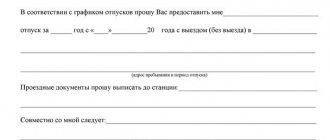For citizens serving under contract in the ranks of the RF Armed Forces, one of the grounds for dismissal will be medical contraindications. To exercise your legal right, you need to undergo a medical examination at the Military Military Commission and submit a report to the command. In this article, we will look at how to correctly draw up a report on dismissal for health reasons of a military man, and who will review this document.
Key Aspects
Any citizen in good health can become a professional military man. However, harsh conditions, exposure to harmful environmental factors, and constant physical activity have a destructive effect on the strongest organism.
Each soldier performs duties for a certain period of time. This period is called service life. The reasons for allowing dismissal from the Armed Forces of the Russian Federation are established by law.
Depending on the reason, termination of army activities is possible on the following grounds:
- unconditional dismissal (reaching the age limit);
- resignation;
- going to reserve;
- by court decision (conviction).
All officers and soldiers serving under contract have the right to leave the army at any time voluntarily or due to deteriorating health.
The problem of retirement (retirement) or transfer arises only with the development of an acute chronic disease. The main criterion for retirement is suitability for military service at any stage. Various health conditions can cause early termination of a contract.
Dismissal from military service for health reasons with payment of compensation has a number of features.
How to receive insurance and other payments and compensation?
To confirm receipt of funds and social assistance, you will need to provide a list of documents, which may vary depending on:
- type of compensation;
- disability groups;
- pensions.
- Military ID.
- Passport details of all family members.
- A document from MSEC confirming injury while performing military duties.
- Certificate from the child’s educational institution.
- Death certificate - in case of death of a military personnel.
The list of documents is transferred at the place of residence to the military commissariat.
List of diseases
When making a decision to dismiss a military personnel for health reasons, the list of diseases according to the International Classification of Diseases (ICD) includes:
- Diseases of the heart and blood vessels (pressure changes).
- Diseases of the nervous system that cause dysfunction of the limbs.
- Problems of the musculoskeletal system that limit movement.
- Acute inflammation of the lower respiratory organs.
- Psychosomatic disorders (including mental disorders).
- Detected tuberculosis.
- Skin diseases.
- HIV infection.
- Venereal diseases.
The military legislation of the Russian Federation stipulates that medical examinations of soldiers and officers are carried out by special military medical commissions.
Based on the results of the examination, the commission issues a conclusion, on the basis of which monetary compensation is paid upon dismissal.
How to write a petition to leave the RF Armed Forces due to illness?
A serviceman can check his health independently or at the direction of his commander. The dismissal process occurs in several stages:
- Submitting complaints to a doctor.
- Referral to a military medical commission.
- Making a decision about suitability.
- Registration of dismissal.
- Receiving cash payments.
In order to write a report, a citizen must have in hand the conclusion of a medical commission. If it is not there, then a report cannot be written for this reason. The following must be specified:
- Information about the addressee (commander of the service institution, his name).
- The rank, position held and department of the person submitting the report must indicate that this is a resignation report.
- Personal information.
- The basis for submitting the report, in this case, is confirmation of the disease.
- A link to the law on the basis of which it is allowed to quit.
- Family composition.
- Is the military provided with housing for permanent residence?
You must put your signature on the report, indicate your last name, initials, position, military rank and date of signature.
The report includes a part where the person lists the documents that he attaches to it.
Where to go
All military personnel are required to periodically undergo a complete medical examination.
A medical examination is carried out in the following cases:
- before signing a contract;
- at regular examination to confirm satisfactory health;
- when complaining about a disease;
- upon receipt of injuries and injuries;
- in case of a sharp deterioration in the health of a serviceman against the background of the development of a chronic disease.
If deviations are detected, the fighter is sent for inpatient treatment to a hospital.
After undergoing treatment, a medical commission evaluates the condition of the officer or soldier and issues a conclusion on his fitness for military duties.
Legislative basis
Legal regulation in the field of military service is carried out through the following regulations:
- Federal Law “On Military Duty and Military Service” (reflects the procedure for admission, passage and discharge from the army).
- Federal Law “On the Status of Military Personnel” (establishes the rights to use social benefits and the amount of a one-time benefit).
- Federal Law “On monetary allowances for military personnel and provision of individual payments to them” (determines payments to those resigning due to illness).
- Decrees of the President of the Russian Federation (on the right to receive housing certificates, on the choice of grounds for termination of a contract by the military).
If a serviceman dies as a result of injuries received or due to deterioration of health caused by professional activity, the state guarantees social benefits and pays benefits to his family.
What diseases can cause
The regulation on military medical examination, approved by the Decree of the Government of the Russian Federation, establishes an exhaustive list of diseases that entail dismissal due to illness for a military personnel.
The list of diseases according to the ICD that are reasons for dismissal includes:
- tuberculosis;
- diseases of the cardiovascular system;
- blood diseases;
- oncology;
- positive HIV status;
- endocrine system disorders;
- severe forms of rheumatism;
- epilepsy;
- mental disorders;
- chronic skin diseases;
- deafness and blindness.
Each type of disease on the list can cause temporary suspension from service or permanent termination of the contract. If an exacerbation of the disease is caused by alcoholism, the serviceman is deprived of the right to dismissal while maintaining military benefits.
Conditions for removal:
- An officer or soldier is subject to regular exacerbations of the disease.
- The doctor notes a high degree of destruction of body functions.
- A chronic disease requires treatment more than 3 times a year.
- A person holding a military position is on sick leave for more than 4 months a year.
Military legislation clarifies that the dismissal of a serviceman due to health problems is his right, not his obligation.
Medical contraindications to military service
Expert opinion
Grigoriev Pavel Kirillovich
Head of the department for conscription of citizens for military service of the Russian Federation
If, during a medical examination, the commission reveals any serious and dangerous disease that may become an obstacle to military service, the citizen may be dismissed.
According to current legislation, military personnel are subject to early dismissal from the RF Armed Forces if they have diseases included in the list of ailments for which they are considered unfit for subsequent service. To identify diseases and determine the state of health, the subject is required to undergo an appropriate examination and, based on its results, submit a report on dismissal.
It is worth noting that when determining the suitability of continuing military service, not only the nature and degree of the disease is taken into account, but also the branch of the military where the person is serving. If the subject has decided to leave his position earlier than the deadline established in the contract, then he should first familiarize himself with the list of ailments for which the military medical commission recognizes him as unfit to continue serving.
A more detailed list of pathologies for which a citizen may be deprived of his position is given in the relevant Regulations on military medical examination.
All diseases can be divided into the following main blocks:
- severe infectious diseases or illnesses caused by the presence of parasites. These usually include human immunodeficiency virus, tuberculosis, syphilis, mycoses;
- all kinds of malignant neoplasms, regardless of the organ and the degree of its damage. Especially if the disease has severely affected the body. If tumors of the brain and spinal cord are detected, the subject is subject to dismissal regardless of the quality of the tumor;
- serious diseases of the blood and hematopoietic organs. In this case, the pathology must certainly have a persistent progressive nature;
- significant disruption of metabolic processes and the functioning of the endocrine system with moderate or significant disruption of the functionality of the entire human body;
- mental disorders of a pronounced nature, as well as varying degrees of schizophrenia;
- pathologies of the human nervous system. This should include inflammation of the central nervous system, epilepsy, systemic atrophy, vascular diseases of the brain;
- diseases of the visual organs with a characteristic impairment of functionality, which arose as a result of serious injuries and burns. The following pathologies should be added to the list: retinal detachment, which is not associated with injury, as well as various color vision anomalies;
- diseases of the ear and mastoid process, persistent vestibular disorders;
- ailments of the circulatory system: heart failure, ischemic disease of the heart muscle with moderate severity;
- damage to the larynx and cervical spine with characteristic respiratory dysfunction, severe asthma;
- pathologies of the digestive system, in particular the esophagus and intestines. Persons with stomach ulcers also cannot serve in the Armed Forces;
- all kinds of skin pathologies that are difficult to treat. This usually includes eczema, psoriasis;
- ailments associated with the functioning of the musculoskeletal system;
- diseases of the genitourinary system;
- consequences of injuries that are severe and entail a serious disorder of the functions of the entire body.
Determination of the degree of suitability
All persons (conscripts, contract soldiers, professional military personnel) undergo a medical examination before entering military service. A commission consisting of specialists from various fields assigns a degree of suitability to each candidate.
The following categories of suitability are legally established:
- A – it is possible to serve in troops of any kind;
- B – military service is possible under certain conditions;
- B – limited suitability;
- D – military duties are temporarily unavailable;
- D – further service in the armed forces of the Russian Federation is not allowed.
Candidates for officer positions are subject to increased mental health requirements.
The assignment of categories is influenced by illness and injury. Having category A, a serviceman does not have the right to retire early for health reasons. Dismissal of a serviceman for health reasons (category D) means unconditional dismissal from the army.
General rules
Fitness for military service implies compliance with certain medical parameters. To do this, each military personnel is required to undergo regular medical examinations at the Military Medical Commission (Military Medical Commission), or comply with the requirement for an extraordinary health check.
Citizens can also apply to be referred to a medical examination if their health condition prevents them from continuing to serve.
The procedure for establishing medical contraindications to military service is as follows:
- if, as a result of a scheduled or extraordinary examination, diseases or factors affecting fitness for military service are established, the MHC experts must indicate in their conclusion one of five categories A, B, C, D, D;
- if the prisoner is in category B (limitedly fit for service), the command is obliged to fulfill the orders of the doctors and transfer the citizen to another position, if the current place of service does not correspond to the indications;
- if the conclusion indicates category D (completely unfit), the unit commander is obliged to dismiss the subordinate, even if he objects to leaving the army.
If category B is confirmed, a citizen can be dismissed only if there is a report. If a subordinate does not want to terminate the contract, the command is obliged to find an opportunity to transfer him to another position or to another location, depending on the orders of the doctors.
Dismissal for health reasons is considered preferential. This means that the citizen will retain the right to receive most benefits related to service. However, the exact list of payments, benefits and compensation will also be influenced by the length of service.
Dismissal mechanism
If health problems interfere with the full performance of official duties, an employee of the armed forces has the right to terminate his service. Unlike workers in civilian areas, a military personnel must justify his dismissal by presenting evidence of the impossibility of being in the army for health reasons.
The dismissal procedure consists of several stages:
- Inpatient (less often outpatient) treatment and examination for professional suitability.
- Issuing a conclusion based on the information reflected in the medical history.
- Drawing up a special protocol in case of unsuitability for further service.
- Submitting a report on dismissal due to health problems.
- Preparation of documents on dismissal from office.
- Termination of the contract with a note about the reason for the termination.
The law stipulates that a citizen can leave the ranks of the armed forces only at his own request. While an employee is undergoing long-term hospital treatment, his dismissal is prohibited.
Rules for writing a report
The report plays an important role in the process of leaving military service, so it must be drawn up as competently as possible.
A specific sample application is not fixed at the legislative level. The application is written in any form, but subject to certain requirements. The report must include the following information:
- last name, first name, patronymic, rank of commander to whom the appeal is addressed;
- name of the document (dismissal report);
- personal data of a serviceman who wishes to leave the armed forces (rank, surname, first name, patronymic, position, date and contract number);
- reasons (presence of a disease that prevents service);
- list of supporting documents (certificates, extracts, conclusions);
- reference to regulations establishing the right to dismissal due to health problems;
- a petition to transfer a personal file to the military commissariat at the place of future residence;
- information about the availability (absence) of housing (the fact of the need to obtain a mortgage loan is also reflected in the report);
- date and signature (signature decoding includes position and title in addition to full name).
If the unit commander agrees with the subordinate’s decision to terminate the contract early, a personal conversation with the candidate for dismissal must be held.
During the conversation, the official is obliged to:
- Inform the employee about the period during which the dismissal will take place.
- Inform about the benefits granted to a citizen when registering for retirement or reserve service.
- Determine the department of the military commissariat for registering the reserve.
- Receive information about your place of residence after termination of the contract.
- Find out if the serviceman has any additional requests.
The content of the conversation is drawn up on a special sheet, which is added to the personal file of the dismissed soldier.
What to do if your application is not accepted?
Dismissal of military personnel is possible only if there are certain reasons, which should be indicated in the report and submitted to a superior officer for approval. To prevent a violation of rights from occurring, every person in the service must know what to do if a report is not accepted.
If the dismissal report is not accepted for any reason, the serviceman has the right to appeal this decision in court. The Constitution of the Russian Federation guarantees judicial protection to military citizens. Such appeals are considered by a military court. The administrative plaintiff himself decides which of the garrison courts to apply to.
To do this you will need:
- Prepare a package of documents that will contain the unaccepted report and the commission’s decision.
- Send a package of documents to the court.
- Prove with the help of a lawyer or your own efforts that you are right.
- Receive dismissal and due payments.
If the report is not accepted, it must be submitted again. The reasons for dismissal must be justified and supported by documents.
If there is no response to the report, you should contact the prosecutor's office. The court in most cases remains on the side of the military personnel, provided that the documents are correctly completed.
Payments upon dismissal of a military personnel for health reasons
One-time payments to military personnel upon dismissal for health reasons include:
- one-time benefit;
- compensation due to loss of health.
The size of the lump sum benefit directly depends on the serviceman’s length of service. With a service period of twenty years or more, the amount of payments ranges from 7 to 15 salaries. In all other cases, when leaving the army, a citizen will receive only 2 to 5 salaries.
Upon dismissal without pension accruals, the former employee of the armed forces continues to receive salary payments for a calendar year.
Also upon retirement, military personnel are entitled to:
- Salary for the last month of service.
- Compensation for property.
- Award for performance of official duties.
- Payment for unused vacation days.
If an employee of the armed forces has alimony obligations, then the full amount of payments will be transferred to the benefit of the recipient.
Category D
Group D is assigned to military personnel who have been diagnosed with serious illnesses that do not allow them to perform their duties. Simultaneously with the assignment of the status of complete unfitness, the corresponding disability groups can be issued. The amount of compensation is calculated individually for each case.
Group B
Category B does not require unconditional dismissal from the army, but limits the range of official duties of the employee. Compensation when determining limited fitness is due only in the event of loss of health during service through no fault of the soldier. Insurance payments are made if there is insurance.
Is there a pension?
The amount of monthly pension payments associated with the presence of a disease depends on the assigned disability group:
- 1st group – 14,000 rubles;
- Group 2 – 7,000 rubles;
- Group 3 – 2,000 rubles.
The amount may differ more if the pensioner served in regions with a higher regional coefficient.
If disability is not confirmed, then the law establishes monthly payments upon reaching the age specified by law or having a minimum total length of service.
Necessary conditions for transfer:
- 45 years old and 20 years of military service.
- 45 years and a total work experience of 25 years (military period of at least 12 years and 6 months).
If your service in the armed forces is at least 10 years, a reserve officer is entitled to preferential mortgage loan terms.
What other guarantees are there for those discharged from military service?
For military pensioners, preferential free travel on transport and extraordinary medical care . In addition, those transferred to the reserve are entitled to:
- Advantages when hiring;
- Including the period of service in the total length of service;
- Providing preferential terms for mortgage lending;
- Possibility of sanatorium-resort treatment;
- Additional guarantees of job security during company reorganization.
The purpose of introducing such privileges is to ensure the fastest possible adaptation of the military personnel to civilian life.
Although dismissal from the armed forces due to illness is more labor-intensive than a similar procedure in a civilian enterprise, social support measures guaranteed in the future smooth out the difficulties that arise.
Free consultation! Didn't find the answer to your question? Find out how to solve your particular problem - contact our lawyer in the online chat on the right, in the form below, or call (24/7):






